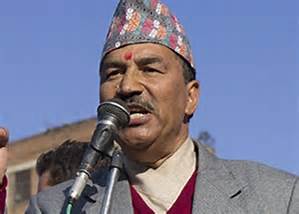DPM Thapa stresses effective implementation of Istanbul Programme of Action
 Kathmandu / May 27: Deputy Prime Minister and Minister for Foreign Affairs, Kamal Thapa, has stressed the need of effective, full and timely implementation of the Istanbul Programme of Action (IPOA) in coherence and synergies with the 2030 Agenda for Sustainable Development and other landmark achievements made last year.
Kathmandu / May 27: Deputy Prime Minister and Minister for Foreign Affairs, Kamal Thapa, has stressed the need of effective, full and timely implementation of the Istanbul Programme of Action (IPOA) in coherence and synergies with the 2030 Agenda for Sustainable Development and other landmark achievements made last year.
DPM Thapa was expressing this while speaking at the plenary of the comprehensive high level Midterm Review of the IPOA for the Least Developed Countries for the decade 2011-2020 held in Turkey on Friday, according to press release circulated by the Ministry of Foreign Affairs.
In order for the effective implementation of the IPOA, the national efforts need to be complemented by adequate international support measures in all pillars including ODA, investments, trade and technology transfer. Addressing structural problems, building productive capacities, and enhancing trade and investment continue to be in the agenda, he underscored.
“More importantly, the IPOA implementation should help overcome the shortcomings due to which only four LDCs could graduate since 1971, when the group was created. It should also serve as the guide to our collaboration with development partners, and to forging solidarity in the international forums. In this context, the importance of the mid-term review of the IPOA cannot be overemphasized,” said DPM Thapa.
According him, during the review exercise, the stakeholders had reflected on the progress made, together with the best practices, and agreed for a way forward for the remaining period to fully implement the IPOA. Since the second half of the IPOA implementation period coincides with the first five years of the 2030 Agenda, it is important to gear up all national, regional and international efforts in tandem.
Arguing that poverty and exclusion foster the breeding ground for conflicts, DPM Thapa said together the increasingly adverse effects of climate change and frequent natural disasters give rise to frequent humanitarian crises in our countries. These often take away the lives and livelihood of our people, reverse our development gains and diminish the economic prospects. Building long-term resilience to disasters must therefore receive priority in line with the recently agreed relevant instruments, he buttressed.
Moreover, he said poverty in LDCs also restricts their technological advancement – a direct enabler of development. While the existing and emerging crises and challenges pose serious threats to their socio-economic progress, the lack of technology base tends to keep them marginalized from the new opportunities. It is in this context that it needs to be ensured that the Technology Bank operates and evolves as a mechanism for necessary support for the LDCs.
The DPM also informed the international community that Nepal was making all efforts to implement the IPOA and was on a right track on making good progress. Nepal has integrated the IPOA into its development programs as well as periodic plans. Soon after the IPOA was adopted, Nepal set a goal for itself to graduate by 2022. Nepal even met the two of the three criteria for graduation for the first time the other year, he elaborated the progress
“Unfortunately, the earthquakes of April and May last year, the obstruction in supplies for several months at the southern border points affected the entire economy, resulting into a humanitarian crisis in the country. Against this backdrop, our goal of smooth and sustainable graduation has become all the more challenging,” he said, adding that the cost of recovery from the earthquakes alone has been estimated at 8.38 billion US dollars. The reconstruction works that aim at ‘building back better’ would require more resources, time and strong partnership. Nepal has started the reconstruction in earnest and is confident that, with enhanced and sustained international support, it would build back better and smarter. To this end, Nepal has already adopted a post-disaster recover framework.
The foreign people were also reminded that with the promulgation of a rights-based, progressive and inclusive constitution in September 2015, soon after the earthquakes, Nepal has entered into a new era of hope and confidence for national development. The development agenda has now come to the fore with the logical conclusion of the peace process and protracted political transition in the country.
Similarly, as he said, Nepal is now in the process of finalizing a new periodic plan for the country, incorporating the 2030 Agenda. Nepal shares the common vision of the world as set out in the 2030 Agenda and other important instruments. It has already begun to integrate them into our development plans and processes.
He thanked UN Secretary-General, Ban Ki-moon, as well as Secretary-General of the Conference, USG Gyan Chandra Acharya and his team for the preparation of the midterm review. RSS
